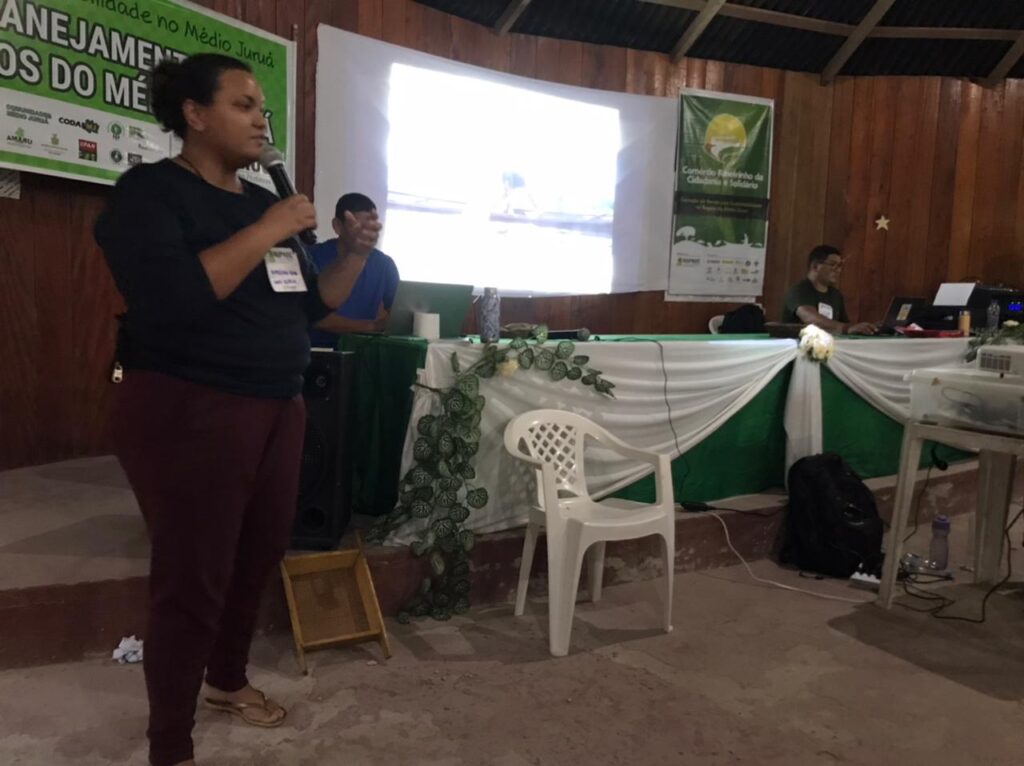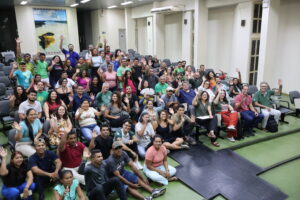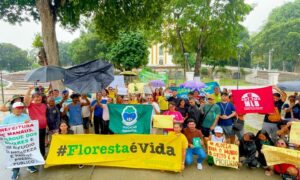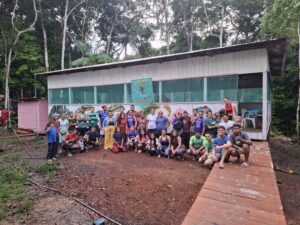Logistic planning, integration of new areas in the arapaima’s counting stage and experience exchange marked the Evaluation and Planning of Lake Management in the Middle Juruá
By Clara Machado

The preparation for sustainable fishing is already underway in the Middle Juruá. The meeting of Evaluation and Planning of Lake Management in the Middle Juruá took place from july 18th to 20th bringing together around 200 people involved with territorial protection and arapaima management at the Bauana Support Base, in the Uacari Sustainable Development Reserve.
The meeting, which takes place annually, is one of the most important events in the territory with high participation from all those involved in conservation activities. It is a moment where all associations and partners involved in the arapaima chain come together to discuss the result of lake protection, share challenges and devise strategies. This year, new areas are going to be included in the arapaima counting in the environments, a stage that precedes the fishing and marks the expansion of this successful model, reaching new communities.
Collectively, the partners establish the schedule for counting and fishing, as well as the entire logistics to commercialization of the harvest. The eagerly anticipated annual arapaima fishing will take place within a few months, following the limit (quota) determined by IBAMA based on last year cout.
In addition to logistical and budgetary planning, the meeting featured presentations by the grassroots associations that play a leading role in lake protection as well as the partner institutions that raised different topics from discussion, such as Chico Mendes Memorial, Sitawi, Instituto Juruá, and the event organizer itself, the Association of Rural Producers of Carauari (ASPROC).
The topic raised by the Instituto Juruá was the fair trade certification offered by Fair Trade USA™, presented by Simelvia Vida, Fishery Resources Analyst. This fair trade certification for arapaima management is a form of protection measure for the culture, for the environment, and the social condition of fishermen, aiming to provide a better strategy for market placement of the product.
According to Simelvia, “the sensibilization in the territory was important to show to the fishery managers what a fair trade seal is, what are the necessary steps to obtain certification, and an overall view of the actions required to bring the certification to Middle Juruá”.

Among the outcomes of the meeting, it was also agreed upon the support of partner organizations for the stages of arapaima management. The Instituto Juruá is the technical responsible for arapaima counting in the fishing agreement areas, as well as in the environments of Itamaraty municipality, an expanding area for arapaima management that is in the process of approving a new fishing agreement.
The Instituto Juruá facilitated the participation of ten representatives from Itamaraty in the meeting, including the Secretary of the Environment of Itamaraty municipality, a representative from the Civil Defense, representatives from Environmental Association, Extractivits, Fishermen and Rural Producers of Itamaraty (AAEPPRI) and members of the Fishermen’s Colony Z-59 of Itamaraty

To Raimundo, known as Manuel, a resident of Itamaraty that represented the AAEPPRI in his presentation, the participation in the event was an injection of cheerfulness and brought a lot of learning.
“For the participants from Itamaraty who were present, it was a glimpse of a new world of possibilities. Here in Itamaraty, the communities and the fishermen’s colony are still organizing themselves to walk together in a way that values environmental preservation. Therefore participating in an event that already has a tradition, years of experience and concrete results already visible, awakens in those who were there, this dream of also making this happen in our municipality” says Manuel.
The exchange between the new expansion areas of arapaima management and experienced organizations is the best way to encourage and provide hope that new forms of territorial protection become possible and capable of bringing improvements in income generation and quality of life.
“The difference in community organization between Itamaraty and Carauari is significant, which is unbelievable because we are neighbors. The idea of closing the fishing agreement in Itamaraty would mark the beginning of a new approach to nature conservation and enable a better quality of life for fishermen and riverside communities. Therefore, this participation, this meeting was relevant because the participants were surprised by what they saw there, such as the level of information and organization within the communities. They returned with the idea that it is possible, it is good and it is worth it” concludes Manuel.






